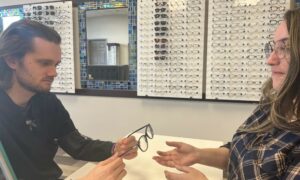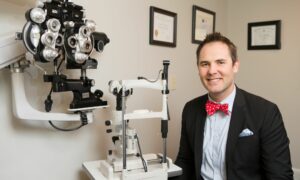
May 27, 2015
One-in-four adults say reading glasses, also known as “readers,” can make someone look ten years older, according to a new study conducted by Jacksonville University in Florida in collaboration with Alcon.
The study was designed to evaluate the effect that readers have on perceived age, and the need for education about presbyopia.
Worldwide, nearly 1.7 billion people have presbyopia, and that number is expected to soar to 2.1 billion by 2020.2
“Readers are ubiquitous, and I was curious about their effect on one’s perceived age,” says survey leader Dr. Heather Hausenblas, a healthy aging expert, researcher and professor at Jacksonville University in the College of Health Sciences’ School of Applied Health Sciences. “In our culture, where youth and beauty are prized, many decisions – like getting collagen fillers or staying fit – are carefully made, while others, like donning readers, may not be. The truth is, most people aren’t aware of any other options for addressing presbyopia, and so readers are a quick fix, but many people may not be aware that readers could be adding years to their appearance.”
The Age Perception Impact Survey, conducted online, examined the perceptions and attitudes of aging among the US population between the ages of 38-54, also known as the Generation X population. It surveyed 1,067 adults who live in the continental US. In addition, Dr. Hausenblas, who evaluated the online survey data, conducted 50 in-depth, live interviews, which included sharing pictures of individuals with and without readers and asking interviewees to guess their age and personal attributes.
“We keep hearing from patients that they really start to think about aging when they have a hard time reading small print on a restaurant menu or their smartphone,” says Carla Mack, OD, MBA, FAAO, Director of Professional and Clinical Support, for US Vision Care at Alcon. “We are excited to offer an alternative to readers with Alcon multifocal contact lenses, which correct presbyopia, a natural aging process of the eyes. This is a non-surgical technology patients can access right in their eye doctor’s office.”
Key findings from the survey showed that although the majority of adults value looking younger (68 percent), almost half do not feel younger than their current age (49 percent). To help feel younger, many adults are taking important steps, such as dyeing their hair (42 percent) and wearing youthful outfits (37 percent). Additionally, they see facelifts and teeth whitening as some of the most expensive ways to look younger. Yet, the majority of adults have overlooked a simple and easy option to help look younger – removing their readers.
“The survey results are fascinating as they highlight some of the impulsive judgments that we make as a society when meeting or seeing someone for the first time,” says Dr.Hausenblas. “Interestingly enough, most people in the survey value youth and beauty, but they aren’t doing everything they can to look younger.”
According to the survey, nearly half of Americans (49 percent) would consider avoiding readers if they knew it made them look older. Of emerging presbyopes between the ages of 38-54, up to 40 percent may mistake their presbyopia for eye fatigue3, but more than one-third said they would visit an eyecare practitioner (ECP) if they knew the ECP could help.4 Of those presbyopes who do not visit an ECP about their symptoms, 20 percent say they do not know there are remedies for presbyopia.5
More than 110 million people in the US are presbyopic, and this population will continue to grow.6* Multifocal contact lenses represent an alternative option which may help many of those with presbyopia. Of presbyopes who do not wear contact lenses, nearly two-thirds (62 percent) are interested in learning how multifocal contact lenses can correct their presbyopia.7
References
1. MayoClinic.org. Presbyopia. http://www.mayoclinic.com/health/presbyopia/DS00589
2. Market Scope. Global Presbyopia-Correcting Surgery Market Report, April 2012.
3. Alcon data on file, July 2014
4. Alcon data on file, July 2014.
5. Alcon data on file, July 2014
6. Alcon data on file, 2013.
7. Alcon data on file, December 2014.

























